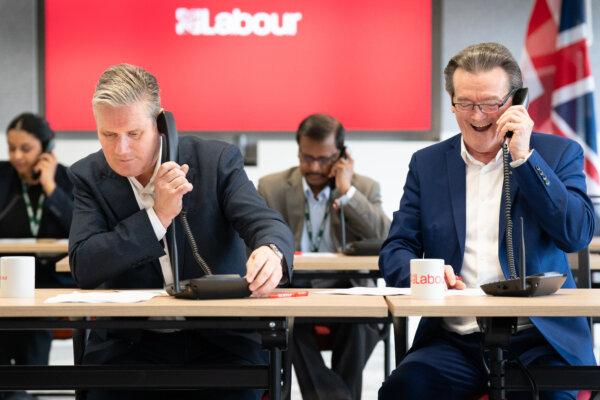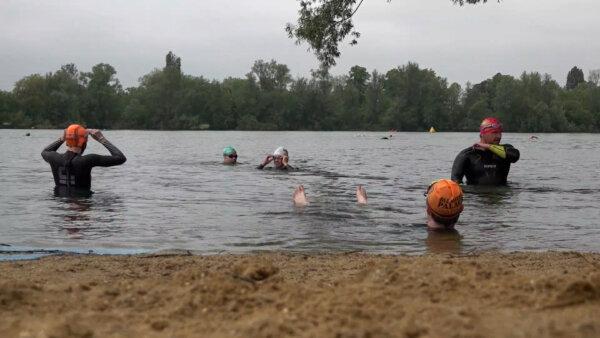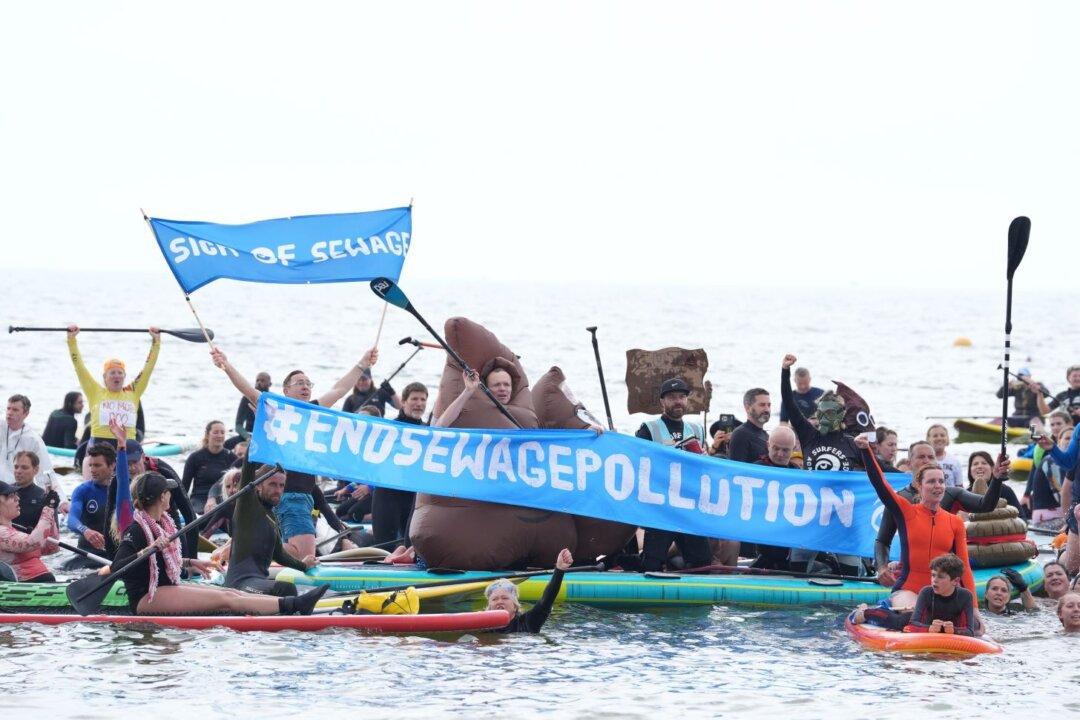In the past five years Feargal Sharkey, the former lead singer of punk band The Undertones, has become the unlikely figurehead for a campaign to improve water quality and stop sewage spills.
The Environment Agency says sewage spills into England’s rivers and seas more than doubled in 2023, with 3.6 million hours of spills last year, compared with 1.75 million hours in 2022.
The water companies say there are good reasons for these statistics and maintain they are pumping big investment into the industry.
So who is right and is nationalisation the answer?
In October 2021 Mr. Sharkey found himself teamed up with the Duke of Wellington—the descendant of the battle of Waterloo victor—as the House of Lords tried and failed to amend the government’s Environment Bill and introduce stronger measures against water companies.
This week Mr. Sharkey firmly nailed his colours to the Labour Party mast.
On Tuesday, asked about Sir Keir’s approach to the water industry, Mr. Sharkey told a fringe meeting at the GMB conference in Bournemouth, “I am incredibly optimistic that Labour will do the job the Tories have failed to deliver.”

It goes on to say: “We will give regulators new powers to block the payment of bonuses to executives who pollute our waterways and bring criminal charges against persistent law breakers.”
“We will impose automatic and severe fines for wrongdoing and ensure independent monitoring of every outlet,” the document added.
Greens Support Nationalisation but not Labour
The only manifesto to put forward renationalising the water industry is that of the Green Party, which was published on Wednesday.But Steve Loftus, a businessman and water industry analyst, says nationalisation is not the answer.
He told The Epoch Times, “Annual investment in infrastructure is two and a half times higher than pre-privatisation.”
The Conservative manifesto points out, “leakage has been cut by a third since privatisation” and “90 percent of our designated bathing waters were classified as good or excellent.”
The Tories say they will work with the regulator, Ofwat, to “further hold companies to account” including potentially banning executive bonuses if water companies are found guilty of a “serious criminal breach.”
Mr. Loftus said the government was right and he pointed out that in 1990 nearly a third of customer complaints received no response within 10 days.
“Now less than 0.4 percent take longer than 5 days,” he added.
Last month, during a visit to Lake Windermere, Liberal Democrat leader Sir Ed Davey accused Conservative ministers of “sitting on their hands” on the issue of water quality.

But Mr. Loftus said: “Sewage gets all the headlines, and sadly it’s the one with the least consistent monitoring data.”
“The truth is that until this government it was ignored. All the uproar we have now about sewage levels is the result of this government actually doing something about it, by installing monitors on all overflows,” he added.
A poll commissioned by the Wildlife Trusts, which was published last week, revealed 78 percent of the public thought the main parties were “doing poorly on river pollution” and nearly two in five said they would vote based on environmental policies offered by candidates.
England’s three biggest listed water companies have announced healthy profits this year and increased their dividends to investors, but all plan to put up water bills.
Severn Trent, United Utilities—which was created from the merger of North West Water and electricity producer Norweb—and Pennon Group—which was rebranded from South West Water in 1998—released their financial results for 2023-2024 last month, revealing a combined profit of £710 million.

Sharkey Calls for Public Inquiry
Mr. Sharkey this week called for a public inquiry into the so-called sewage crisis and said the current system had, “utterly failed.”He said customers were promised lower bills and better water quality when the industry was privatised but added: “We have ended up with every river in England being polluted, while £72 billion of your money has been stripped out.”
Permanent Fix Would Cost ‘Hundreds of Billions’
He said that in order to solve the issue completely, “it would hundreds of billions of pounds” and he pointed out, “You'd have to dig up every town centre and it would cause enormous economic disruption.”He said this “financial black hole” meant few politicians would want to renationalise the water industry.
Prof. Comber also pointed out that many pension trusts owned shares in the water companies.
The water industry was privatised by Margaret Thatcher’s Conservative government in 1989.
Ten regional franchises were set up with a regulator, Ofwat, who were suppose to monitor pricing and a separate water quality regulator, the Drinking Water Inspectorate.
Water had only been nationalised in 1973—ironically by another Tory government, under Edward Heath—and prior to that there had been hundreds of local water companies.
Mr. Loftus told The Epoch Times while Mrs. Thatcher’s approach to privatisation was originally “dogmatic”, it later became a practical solution when the European Union began floating the idea of tougher water regulations.
The Urban Waste Water Treatment Directive (UWWTD) was eventually passed in 1991, two years after the British water industry was privatised.
Mr. Loftus said, “While it was initially a principled decision, it would have needed to be privatised to get the investment required to meet UWWTD standards in time.”
“There was no appetite to add billions to the UK balance sheet for water with money needed elsewhere,” he added.
Prof. Comber started out in the water industry in 1989 and he says he feels privatisation was a case of “selling off the family silver” with the hope it would stimulate investment.
He said there had no doubt been massive investment by the water companies in the 1990s but he said it tailed off and he said recently there had been a, “damning realisation that more investment is needed.”
The report found hair and blood analysis of 17 politicians and environmental leaders—including Conservative MP Philip Dunne and Labour MP Alex Sobel—showed they all tested positive for PFAS.
As an environmental chemist, Prof. Comber believes the so-called forever chemicals are a major worry.
He said, “Sewage and industrial effluents contain thousands of chemicals and sewage treatment works are only designed to remove poo, paper and pee.”
He said there was no doubt the standards of water quality monitoring was far improved on the 1980s and 1990s and said that made it difficult to say whether pollution has been worse since privatisation.
In an article in April 2024 Matthew Lesh, the Institute of Economic Affairs’ director of public policy and communications, questioned claims about “record amounts of sewage dumping.”

He wrote: “Data collection from overflow pipes only began in 2015, and last year was the first time ever that 100 percent of sewage releases have been counted. This makes historical comparisons worse than useless. They are deceptive.”
“These facts have not, however, stopped Liberal Democrat leader Ed Davey from describing the situation as a ‘scandal’ and calling for the declaration of a national environmental emergency. Nor has it muted the oft-heard demand to renationalise water,” he added.
Sitting next to Mr. Sharkey at the GMB conference this week, Colin Skellet, chief executive of Wessex Water, agreed there had been a lack of investment over the years.
But he said, “We need investment, but the right kind of investment by investors who are in for the long term rather than those who only come in and strip cash out.”







